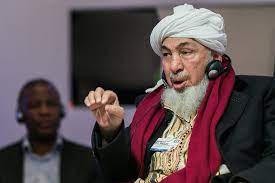Mauritanian scholar Sheikh Ibn Bayyah who is an important figure in the Muslim world is the initiator of the Conference for Peace in Africa in Nouakchott, now a popular event on the continent.
By Barka Ba
It is a singular ballet of personalities who paraded from January 17 to 19, 2023, at the Al Murabitoune Palace in Nouakchott, on the outskirts of the Mauritanian capital, where the third edition of the “Conference for Peace in Africa” was held.
The forum, rare on the continent, which brings together dozens of religious leaders from the Muslim world, politicians, diplomats, experts and journalists from around the globe, is intended to reflect on possible responses to the phenomenon of extremism.
As a sign of the growing importance of this meeting, Nigerian President Muhammadu Buhari attended the opening ceremony, in the presence of his Mauritanian counterpart Mohamed Ould Ghazouani.
Their other counterparts Mohamed Bazoum of Niger and Paul Kagame of Rwanda virtually delivered video messages.
The initiator of the forum is the Mauritanian-born scholar Sheikh Abdallah Ibn Mahfoudh ibn Bayyah, 88, based between Saudi Arabia and the United Arab Emirates, whose intellectual output is widely followed in the Muslim world where his opinions are authoritative.
Currently president of the Fatwa Council of the United Arab Emirates, the cleric, who was for a long time a professor at the King Abdulaziz University in Jeddah, was during the 1970s Minister of Justice in the regime of the father of Mauritanian independence, Moktar Ould Daddah, who was in power from 1958 to 1978.
Born into a large family of scholars in eastern Mauritania, near the Malian border, this follower of the Sufi brotherhood of Chadhilia (a branch of the Qadiriyya) is one of the few influential Muslim religious leaders in the Gulf countries who does not come from the Wahabbite or Salafist movements.
This polyglot, equally at ease in Arabic and French, received worldwide acclaim when then US president Barack Obama cited him in a famous speech to the UN Security Council in 2014 as the epitome of an enlightened religious leader.
But Ibn Bayyah is most famous for issuing a fatwa that had a huge impact in the Muslim world, entitled “This is not the way to paradise,” which dismantles, on the basis of an implacable Islamic argument, the radical theses of the Islamic State Organisation that destabilises a significant part of Muslim countries.
The Mauritanian is also known for having contradicted the late Youssef Al Qaradawi, a famous preacher close to the powerful “Muslim Brotherhood” and undisputed star of the Qatari channel Al Jazeera, during the “Arab Spring.”
While the naturalized Egyptian Qatari gave his blessing to the uprisings that were to sweep away several Arab regimes, Ibn Bayyah took the opposite view by advocating reform instead of revolution, saying in essence that even a bad government was preferable to disorder and Fitna (discord).
One of the specificities of Mauritania is that the country, through the prestige and intellectual influence enjoyed by some of its citizens in Muslim countries, is developing a real religious soft power.
In addition to Sheikh ibn Bayyah, Mauritania is also the birthplace of Mohamed El Hassan Ould Dadaw, one of the main religious leaders of the Mauritanian version of the Muslim Brotherhood, Tawassoul, which is also one of the most influential ideologues of the Brotherhood and its allies in power, including the Emir of Qatar and the Turkish President Recep Tayyip Erdogan.
A little more controversial, Mahfoudh Ould al-Walid, alias “Abu Hafs Al Mouritani,” also a native of the “country of a million poets,” the nickname of Mauritania in the Arab world, was the friend, spiritual master and adviser of Osama Bin Laden, the founder of Al Qaeda, of which he was also the Number 3 in the hierarchy, before making amends and breaking with jihadism.
This episode was recounted by journalist Lemine Ould M. Salem in a reference book, “L’Histoire secrète du djihad. D’Al-Qaeda à l’État islamique,” published in 2018 by Flammarion.
It reveals a little-known detail to the Mauritanian and Senegalese public in particular about Abu Hafs whose father owned several businesses between the two shores of the Senegal River.
He was an apprentice shopkeeper in Rufisque, Senegal.
BB/los/lb/as/APA


